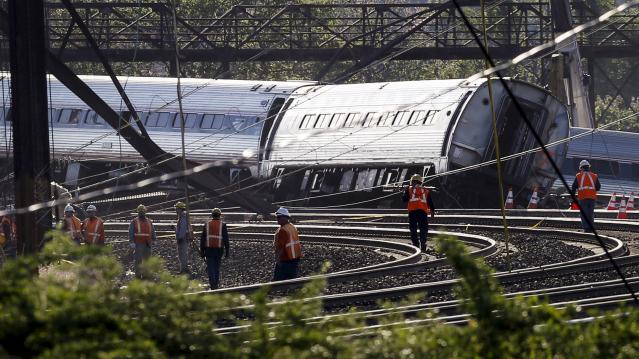After the Amtrak Crash: Finding the Money to Fix Our Infrastructure

The Amtrak derailment in Philadelphia that left six people dead and dozens more injured has already prompted calls for increased infrastructure spending. "This one is a wake-up call," New York City Mayor Bill de Blasio said Wednesday on MSNBC’s Morning Joe. "We have got to get serious about investing in infrastructure."
There have been other wake-up calls before, and the dire need for infrastructure renewal isn’t news. Yet, as Politico’s Kathryn A. Wolfe reported, the deadly crash occurred just as a House panel was set to mark up a bill that would cut Amtrak’s funding for 2016 to $1.13 billion, or about $250 million less than the railroad service typically gets. (To be fair, it’s also not clear at this point what caused the horrific Amtrak derailment and whether infrastructure problems played a part or not — and the number of rail accidents each year has actually fallen significantly since 2006, according to Federal Railroad Administration data.)
Related: At Least 6 Die in Philadelphia Train Derailment, Scores Hurt
Even before the Amtrak tragedy, though, de Blasio and Oklahoma City Mayor Mick Cornett, a Republican, along with some two dozen other mayors were scheduled to travel to Washington, D.C. today to press Congress for a long-term renewal of the federal transportation authorization bill. The current funding law is set to expire May 31.
Pretty much everyone agrees that it’s well past time for the country to repair and rebuild its dangerously dated bridges, roads, railways, water mains and other critical infrastructure. The hold-up has always been over how to fund it.
Here’s one suggestion: The U.S. has spent some $110 billion on rebuilding Afghanistan, including billions that can’t be accounted for or that the inspector general has found have been wasted. That’s a drop in the bucket compared to the trillions in domestic infrastructure spending that some have called for. Still, clamping down on that waste in Afghanistan, and on other money being frittered away, might allow for some spending to be redirected to other necessary and more productive needs, like domestic infrastructure.
That’s not to suggest we must entirely abandon nation building abroad in order to rebuild this country. It’s just to point out that Congress should be able to find the money to address our national priorities, something it has miserably failed to do of late.
Tweet of the Day: The Black Hole of Big Pharma

Billionaire John D. Arnold, a former energy trader and hedge fund manager turned philanthropist with a focus on health care, says Big Pharma appears to have a powerful hold on members of Congress.
Arnold pointed out that PhRMA, the main pharmaceutical industry lobbying group, had revenues of $459 million in 2018, and that total lobbying on behalf of the sector probably came to about $1 billion last year. “I guess $1 bil each year is an intractable force in our political system,” he concluded.
Warren’s Taxes Could Add Up to More Than 100%

The Wall Street Journal’s Richard Rubin says Elizabeth Warren’s proposed taxes could claim more than 100% of income for some wealthy investors. Here’s an example Rubin discussed Friday:
“Consider a billionaire with a $1,000 investment who earns a 6% return, or $60, received as a capital gain, dividend or interest. If all of Ms. Warren’s taxes are implemented, he could owe 58.2% of that, or $35 in federal tax. Plus, his entire investment would incur a 6% wealth tax, i.e., at least $60. The result: taxes as high as $95 on income of $60 for a combined tax rate of 158%.”
In Rubin’s back-of-the-envelope analysis, an investor worth $2 billion would need to achieve a return of more than 10% in order to see any net gain after taxes. Rubin notes that actual tax bills would likely vary considerably depending on things like location, rates of return, and as-yet-undefined policy details. But tax rates exceeding 100% would not be unusual, especially for billionaires.
Biden Proposes $1.3 Trillion Infrastructure Plan

Joe Biden on Thursday put out a $1.3 trillion infrastructure proposal. The 10-year “Plan to Invest in Middle Class Competitiveness” calls for investments to revitalize the nation’s roads, highways and bridges, speed the adoption of electric vehicles, launch a “second great railroad revolution” and make U.S. airports the best in the world.
“The infrastructure plan Joe Biden released Thursday morning is heavy on high-speed rail, transit, biking and other items that Barack Obama championed during his presidency — along with a complete lack of specifics on how he plans to pay for it all,” Politico’s Tanya Snyder wrote. Biden’s campaign site says that every cent of the $1.3 trillion would be paid for by reversing the 2017 corporate tax cuts, closing tax loopholes, cracking down on tax evasion and ending fossil-fuel subsidies.
Read more about Biden’s plan at Politico.
Number of the Day: 18 Million

There were 18 million military veterans in the United States in 2018, according to the Census Bureau. That figure includes 485,000 World War II vets, 1.3 million who served in the Korean War, 6.4 million from the Vietnam War era, 3.8 million from the first Gulf War and another 3.8 million since 9/11. We join with the rest of the country today in thanking them for their service.
Chart of the Day: Dem Candidates Face Their Own Tax Plans

Democratic presidential candidates are proposing a variety of new taxes to pay for their preferred social programs. Bloomberg’s Laura Davison and Misyrlena Egkolfopoulou took a look at how the top four candidates would fare under their own tax proposals.


